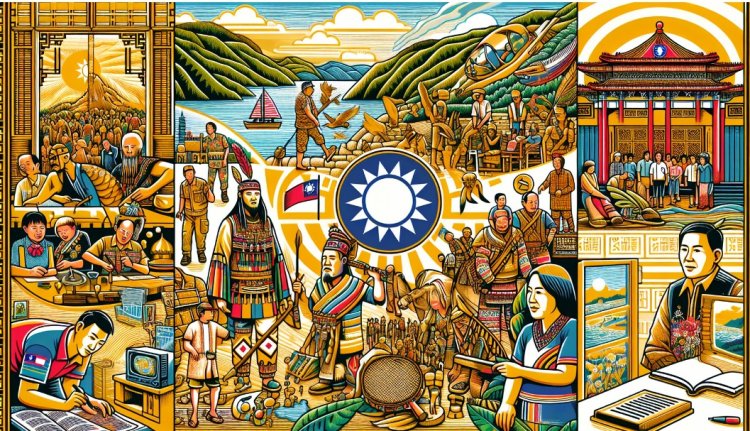Taiwan's Identity: The Longing for Freedom
Explore the depths of 'Taiwan's Identity: The Longing for Freedom', a comprehensive analysis of Taiwan's quest for identity and autonomy. This poignant narrative delves into Taiwan's historical, cultural, and political journey, highlighting its aspirations for freedom and the challenges it faces in preserving its unique identity amid global and regional dynamics.

Introduction
The conflict between Taiwan and Beijing has been a contentious issue that has lasted for over seven decades. It originated when Chiang Kai-shek and his army fled to Taiwan in 1949 after losing to Mao Zedong's communist troops. Taiwan became the Republic of China and aimed to regain control of the entire country. However, over the years, Taiwan has developed into a model of democracy, while Beijing remains determined to reclaim it.
This conflict is not only significant for Taiwan and Beijing but also for the entire world. If the situation escalates, it could have global consequences. The historical background of this conflict begins with the Japanese occupation of Taiwan in 1895, then the Chinese nationalist regime, and the subsequent Chiang Kai-shek dictatorship.
The main focus of this blog is Taiwan's identity. Taiwan has evolved into a unique entity with its own cultural, religious, and linguistic blend over the past 70 years. The indigenous tribes of Taiwan have played a significant role in preserving their traditions and challenging the perception that all Taiwanese are Chinese. The emergence of a new Taiwanese identity, as exemplified by figures like Kolas Yotaka, demonstrates the openness, inclusivity, and democracy that Taiwan now embodies.
The Roots of Taiwanese Identity
When Chiang Kai-shek and his army fled to Taiwan in 1949 after losing to Mao Zedong's communist troops, it marked a significant turning point in Taiwanese history. Taiwan became the Republic of China and aimed to regain control of the entire country. However, over the years, Taiwan has developed its own unique identity and a desire to maintain its sovereignty separate from mainland China.
Taiwan has increasingly distanced itself from mainland China, both politically and culturally. The country has evolved into a model of democracy, embracing openness, inclusivity, and democratic values. The Taiwanese people have worked hard to preserve their cultural, religious, and linguistic blend over the past 70 years, challenging the perception that all Taiwanese are Chinese.
One significant factor in shaping Taiwanese identity is the role of indigenous peoples. Taiwan is home to 16 indigenous tribes and 16 languages. These indigenous groups have faced marginalization and the loss of their lands, but they have played a crucial role in preserving their traditions and heritage. They have challenged the notion that all Taiwanese people are Chinese and have highlighted the diversity and richness of Taiwanese culture.
The emergence of figures like Kolas Yotaka, an indigenous Taiwanese politician, showcases the openness, inclusivity, and democracy that Taiwan now embodies. Kolas Yotaka, who identifies as Amis, one of the indigenous tribes, represents the new Taiwanese identity and strives to give indigenous peoples a voice in Taiwanese politics.
Overall, the roots of Taiwanese identity can be traced back to Chiang Kai-shek's escape to Taiwan and the establishment of the Republic of China. Taiwan's desire to maintain sovereignty has led to an increasing distance from mainland China. Additionally, the indigenous peoples of Taiwan have played a significant role in shaping Taiwanese identity, preserving their traditions, and challenging the perception of Taiwanese as solely Chinese.
Taiwan's Colonial History
Various foreign powers that have ruled over Taiwan have woven a complex tapestry out of the island's colonial history. The Dutch, who established trading posts, were the second group to colonize Taiwan in the 17th century after the Spanish. However, their rule was short-lived, and Taiwan soon fell under Qing dynasty control in the 17th century.
The Qing dynasty maintained control over Taiwan for nearly two centuries until the late 19th century when Japan defeated China in the First Sino-Japanese War. Under the Treaty of Shimonoseki in 1895, Taiwan was ceded to Japan, marking the beginning of a new colonial era for the island.
The Japanese occupation of Taiwan lasted for 50 years, during which the island underwent significant changes. The Japanese introduced modern infrastructure, including roads and buildings, and implemented policies that aimed to assimilate Taiwanese people into Japanese culture. The Japanese language became compulsory, and Taiwanese people were forced to adopt Japanese names.
The impact of the Japanese occupation on Taiwanese identity was profound. While some embraced Japanese culture and language, others resisted and sought to retain their own traditions and sense of identity. The indigenous tribes of Taiwan, in particular, faced struggles during this time, as their lands were taken away and their customs and traditions were suppressed.
The legacy of Taiwan's colonial history can still be seen today in the shaping of modern Taiwan. The period of Japanese occupation had a lasting impact on Taiwanese society, politics, and culture. Taiwan's identity as a unique entity distinct from mainland China began to take root during this time, as the Taiwanese people developed a desire to maintain their sovereignty and separate themselves from mainland China.
The struggles faced by indigenous tribes during colonial rule also left a lasting legacy. While they have fought to preserve their traditions and challenge the perception of Taiwanese as solely Chinese, they continue to face challenges in reclaiming their lands and protecting their cultural heritage.
Overall, Taiwan's colonial history is a complex and multifaceted story that has shaped the island's identity and continues to influence its development. Understanding this history is crucial to gaining a deeper appreciation for the unique culture and struggles faced by the people of Taiwan.
From Authoritarianism to Democracy
Taiwan's journey from authoritarianism to democracy has been a complex and transformative process. It has seen the rise of new leaders, social movements, and a new generation of politically engaged Taiwanese. Here are some key highlights of this transition:
Chiang Kai-shek's leadership and his controversial legacy
Chiang Kai-shek, the leader of the Republic of China, played a significant role in shaping Taiwan's identity. While he led the resistance against Japan during World War II and implemented agrarian reforms that boosted the economy, his regime was also marked by repression and human rights abuses. The "White Terror" period, characterized by political purges and suppression, left a lasting impact on Taiwanese society.
Transition to democracy and the role of Lee Teng-Hui
In 1996, Taiwan achieved a major milestone with its first presidential elections. Lee Teng-Hui, a technocrat and member of the Democratic Progressive Party, became the first popularly elected president. He pushed for reforms that helped dismantle the authoritarian regime and paved the way for a more inclusive and democratic Taiwan.
Implications of the Sunflower Movement
In 2014, the Sunflower Movement emerged as a powerful force for change. Prompted by concerns over a proposed free trade agreement with China, hundreds of students occupied the Taiwanese parliament in protest. This movement highlighted growing youth activism and the demand for greater transparency and citizen participation in politics.
The rise of a new generation of politically engaged Taiwanese
The Sunflower Movement ignited a sense of political awareness and engagement among young Taiwanese. This new generation is more oriented towards individualistic and democratic values, identifying themselves primarily as Taiwanese rather than Chinese. They actively participate in social and political issues, utilizing social media and other platforms to voice their opinions and shape the future direction of Taiwan.
The role of prominent figures like Audrey Tang
Audrey Tang, a transgender and self-taught hacker, has emerged as a prominent figure in Taiwanese politics. As the Minister for Digital Affairs, Tang has implemented initiatives to promote digital democracy and citizen participation. Their inclusive and open approach to governance represents the new Taiwanese identity, characterized by diversity, innovation, and democratic values.
Taiwan's transition from authoritarianism to democracy has been a challenging and ongoing process. It has seen the emergence of new leaders, social movements, and a shift in the collective identity of the Taiwanese people. The resilience and determination of the Taiwanese to preserve their sovereignty and democratic values in the face of external pressures have made Taiwan a model of democracy in Asia and an inspiration to other nations.
Taiwan's Relationship with China
The relationship between Taiwan and China has been a complex and contentious issue for decades. Here are some key points to understand:
Debate over Taiwanese identity: Chinese or Taiwanese?
There is an ongoing debate over Taiwanese identity, with some identifying as Chinese and others as Taiwanese. Over time, Taiwan has developed its own unique cultural, religious, and linguistic blend, challenging the perception that all Taiwanese are Chinese. The emergence of a new Taiwanese identity, as exemplified by figures like Kolas Yotaka, demonstrates the openness, inclusivity, and democracy that Taiwan embodies.
Increasingly interlinked economies, despite political tensions
Despite political tensions, Taiwan and China have increasingly interlinked economies. Many Taiwanese work on the mainland, and China is a major consumer of Taiwanese exports. However, even in the business world, there is a growing orientation towards Japan, New Zealand, and Europe rather than China.
The younger generation's orientation towards Japan and the West
The younger generation in Taiwan is more oriented towards Japan, New Zealand, and Europe than China. They identify themselves primarily as Taiwanese and are more politically engaged, actively participating in social and political issues. Social media and satirical videos are often used to mock Chinese propaganda.
Satirical response to Chinese propaganda
Taiwanese media, such as the "Eye CTV" channel, has gained popularity by creating satirical videos that parody Chinese state television. This form of media provides a platform for Taiwanese citizens to express their opinions and channel their emotions in response to Chinese propaganda.
The Kuomintang's stance on unification
The Kuomintang nationalist party, one of Taiwan's main parties, supports a conciliatory attitude toward Beijing and advocates for swift unification with mainland China. However, the majority of Taiwanese are against unification and prefer to maintain the status quo.
The Future of Taiwanese Identity
The conflict between Taiwan and China has had a significant impact on Taiwan's identity. Over the years, the millennial generation has developed a strong identification as Taiwanese. They embrace openness, inclusivity, and democratic values, which are the foundations of Taiwan's modern identity.
Preserving the status quo is of utmost importance for the millennial generation and many Taiwanese citizens. Taiwan has evolved into a model of democracy and aims to maintain its sovereignty separate from mainland China. The desire to preserve their unique cultural, religious, and linguistic blend has led to an increasing distance from mainland China.
While Taiwan values its economic ties with China, there are potential risks in provoking China. The two countries have increasingly interlinked economies, and Taiwan is a major exporter to China. However, there is also a growing orientation towards Japan, New Zealand, and Europe, indicating a shift away from China in the business world.
Some Taiwanese citizens, like Robert Tsao, recognize the potential risks and have taken steps to train citizens for potential conflict. Tsao's efforts include establishing a civil defense training college and launching a media campaign against unification with China. He calls for a constitutional amendment and changing the country's name from the Republic of China to Taiwan to unite the island's citizens behind a clear position.
The future of Taiwanese identity is shaped by the millennial generation's strong identification as Taiwanese, the importance of preserving the status quo, and the potential risks of provoking China. While there are challenges and tensions, Taiwan remains committed to maintaining its sovereignty and democratic values. The emergence of figures like Kolas Yotaka, Audrey Tang, and Robert Tsao showcases Taiwan's openness, inclusivity, and democracy and serves as an inspiration to other nations.
Taiwan's Resilience and Democracy
Taiwan has emerged as a model of democracy in Asia, ranking 8th in the region and 10th worldwide, according to 'The Economist magazine. The country's commitment to democratic values is evident in its progressive policies and inclusivity.
One of the most significant milestones in Taiwan's journey towards inclusivity is the legalization of same-sex marriage in 2019. Taiwan became the first Asian country to recognize and legalize same-sex marriage, showcasing its commitment to equal rights and social progress.
Taipei Pride, an annual event that attracts over 120,000 participants, has become a symbol of Taiwan's openness and acceptance. The vibrant celebration of LGBTQ+ rights demonstrates Taiwan's commitment to inclusivity and serves as a beacon of hope for LGBTQ+ communities in Asia.
The emergence of figures like Kolas Yotaka, an indigenous Taiwanese politician, further exemplifies Taiwan's commitment to inclusivity and democracy. Kolas Yotaka, who identifies as Amis, represents the new Taiwanese identity and strives to give indigenous peoples a voice in Taiwanese politics.
Taiwan's resilience in the face of external pressures is evident in its optimism and confidence in its identity. The younger generation, in particular, identifies themselves primarily as Taiwanese and actively participates in social and political issues. They utilize social media and other platforms to voice their opinions and shape the future direction of Taiwan.
Despite political tensions with mainland China, Taiwan's commitment to maintaining its sovereignty and democratic values remains unwavering. The country's resilience and determination have made it a model of democracy in Asia and an inspiration to other nations.
Consequences of the Taiwan-Beijing Conflict
The conflict between Taiwan and Beijing has far-reaching implications that extend beyond the two nations involved. The global community should pay close attention to the conflict, as it could have significant global consequences.
If the situation escalates, it could lead to tensions and potential military conflict in the region. This could have severe risks to peace and stability, not only in Taiwan and China but also in neighboring countries. The international community should prioritize efforts to de-escalate the conflict and promote peaceful resolutions.
Supporting Taiwan's democracy is of the utmost importance. Taiwan has evolved into a model of democracy in Asia, embracing openness, inclusivity, and democratic values. It is crucial to recognize and support Taiwan's desire to maintain its sovereignty separate from mainland China. This includes advocating for Taiwan's participation in international organizations and upholding its right to self-determination.
International attention and awareness are needed to ensure that the conflict is properly addressed. The global community should stay informed about the situation, promote dialogue and diplomacy, and encourage peaceful resolutions. By raising awareness and understanding the complexities of the conflict, we can contribute to a more peaceful and stable future in the region.
FAQ
What is the current status of the conflict between Taiwan and Beijing?
The conflict between Taiwan and Beijing remains ongoing. Taiwan, a model of democracy, seeks to maintain its sovereignty, while Beijing is determined to reclaim it. The situation is a high-risk show of strength between the two rival capitals.
Why is Taiwan's identity important?
Taiwan's identity is important as it has evolved into a unique entity with its own cultural, religious, and linguistic blend over the past 70 years. It challenges the perception that all Taiwanese are Chinese and represents openness, inclusivity, and democracy.
How has Taiwan's colonial history influenced its identity?
Taiwan's colonial history, including Spanish, Dutch, Qing dynasty, and Japanese rule, has shaped its identity. The indigenous tribes of Taiwan have played a significant role in preserving their traditions and challenging the perception of Taiwanese as solely Chinese.
What role did Chiang Kai-shek play in shaping Taiwan?
Chiang Kai-shek, the leader of the Republic of China, played a significant role in Taiwan's history. While he oversaw agrarian reforms and led the resistance against Japan during World War II, his regime was characterized by repression and violations of human rights.
What is the younger generation's perspective on Taiwanese identity?
The younger generation in Taiwan identifies themselves primarily as Taiwanese and embraces openness, inclusivity, and democratic values. They actively participate in social and political issues and utilize social media to voice their opinions.
Is Taiwan leaning towards independence or unification with China?
Taiwan's majority population is against unification with China and prefers to maintain the status quo. They desire to preserve their unique cultural, religious, and linguistic blend and distance themselves from mainland China.
What are the potential risks and consequences of the conflict?
The conflict between Taiwan and Beijing could lead to tensions and potential military conflict in the region. It could have severe risks for peace and stability, not only for Taiwan and China but also for neighboring countries.
What steps can be taken to support Taiwan's democracy?
Supporting Taiwan's democracy is crucial. The international community can prioritize efforts to de-escalate the conflict, promote peaceful resolutions, advocate for Taiwan's participation in international organizations, and uphold its right to self-determination.
How can individuals contribute to raising awareness about Taiwan's identity?
Individuals can contribute to raising awareness about Taiwan's identity by staying informed about the situation, promoting dialogue and diplomacy, and encouraging peaceful resolutions. They can also share information, engage in discussions, and support organizations working to protect Taiwan's democracy.



 admin
admin 










